Niacin Benefits: 14 Health-Boosting Effects Of Vitamin B3
We are sure you don’t want to miss out on the amazing effects it can have on your health.

Image: shutterstock
Niacin benefits our body in numerous ways. It is essential for cellular and DNA health. Also known as vitamin B3, many of us know it just as a prescription drug. But as you dig deeper, you will be shocked to know its potential. This article explores what niacin is, its benefits, recommended daily dosage, the foods rich in this nutrient, and more. Keep scrolling!

 Did You Know?
Did You Know?In This Article
What Is Niacin?
Also called vitamin B3, this nutrient is water-soluble and found in several common foods like meat, tuna fish, seeds, mushrooms, etc. It is a part of the B-complex vitamins, which also include thiamine (vitamin B1), riboflavin (vitamin B2), and others. It’s one of the best vitamins for glowing skin.
Niacin is the medical name of vitamin B3 and comes in 3 forms – nicotinic acid, niacinamide (also called nicotinamide), and inositol hexaniacinate. It is an important vitamin and benefits one in several ways – right from protecting the heart and improving metabolism to enhancing brain function and aiding diabetes treatment (1).
Nicotinic acid works as a supplement and is used to treat high blood cholesterol and heart disease. Niacinamide can help treat type 1 diabetes, certain skin conditions, and schizophreniai A mental illness that impairs one's capacity for thought, emotion, and behavior and is characterized by hallucinations and delusions. (it doesn’t lower cholesterol, though). Hence, certain forms of niacin offer you certain benefits. We strongly recommend you consult your doctor to understand which is which.
Well, the benefits are so many. But before we speak about how niacin benefits your health, we must first know how niacin works.
Key Takeaways
- Niacin (vitamin B3) helps maintain your cellular and DNA health.
- Niacin can treat certain types of schizophrenia as the vitamin undoes the damage done to the brain.
- Niacin deficiency can cause fatigue, indigestion, scaly rashes, vomiting, and memory loss.
- Niacin helps treat erectile dysfunction and insomnia.
- Excess niacin consumption can cause allergic reactions and irregular heartbeat.
How Does Niacin Work?
In simple terms, niacin helps the enzymes do their job. Specifically speaking, niacin is a major component of NAP and NADP, which are two coenzymes involved in cellular metabolism. Niacin also prepares and repairs DNA and even works as an antioxidant.
But hey, how will you know if you are getting enough niacin? The next section can help you understand.
What Are The Symptoms Of Niacin Deficiency?
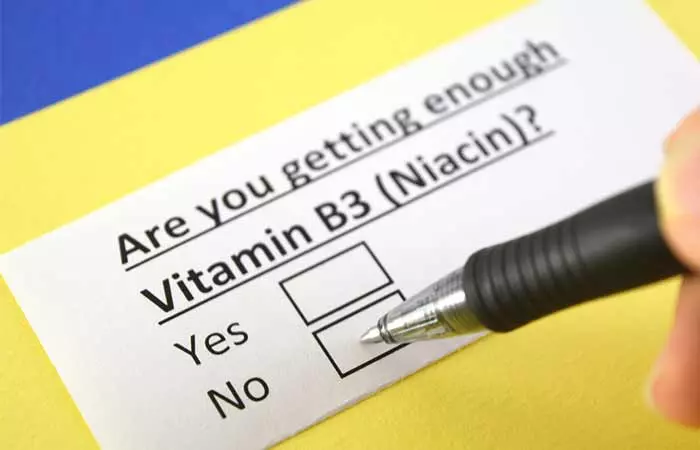
This deficiency occurs not only when you don’t get enough niacin but also when your body can’t absorb tryptophan, its amino acid precursor.
Following are the symptoms of niacin deficiency:
- Fatigue
- Indigestion
- Vomiting
- Canker soresi A painful, non-contagious, shallow sore that develops inside the mouth or at the gum line, brought on by stress, acidic foods, or injury.
- Depression
- Anxiety
Severe deficiency of niacin (also called pellagra, which we will discuss later in this post) can lead to the following symptoms:
- Scaly rashes on the skin exposed to sunlight
- Vomiting and diarrhea
- Apathy
- Disorientation
- Memory loss
- Depression
- Swollen mouth
This deficiency not only occurs when you do not get enough niacin. There are specific populations who are at a higher risk of niacin deficiency, such as (2):
- people with alcoholism
- individuals with gastrointestinal diseases
- people with cancer
- people with Hartnup disease
- HIV patients
- those on certain medications
- individuals with carcinoid tumors
Consuming adequate niacin not only prevents these symptoms, but, more importantly, offers certain significant benefits.
What Are The Benefits Of Niacin (Vitamin B3)?
Though certain supported benefits of niacin have conflicting evidence, this vitamin does improve skin and brain health, along with improving digestion and arthritis symptoms.
1. Improves Heart Health
Niacin is often used to improve the levels of good cholesterol, which, in turn, reduces the bad cholesterol – ultimately strengthening the heart (3). Niacin works by blocking the way your liver makes cholesterol.
But hold on – niacin seems to work only in those people who are already on cholesterol medications. And sources also state that it can often cause uncomfortable and dangerous side effects. Hence, make sure you talk to your doctor before taking niacin for your heart as there is conflicting evidence in this regard.
2. Might Help Treat Type 1 Diabetes
This could be true with type 1 diabetes, where the immune system mistakenly attacks the cells in the pancreas that produce insulin. Niacinamide might protect these cells for a while. But we need more research to understand if niacin can help with diabetes management in the long run (4).
High dose of niacin also had cut the risk of type 1 diabetes in children who were at risk, but that was the result of just one preliminary research.
3. Can Improve Skin And Hair Health
Niacin is known to boost the water content in the skin – and this can be achieved by topically applying nicotinamide cream. The cream was also found to help treat acne.
Niacin also has beneficial effects for rosacea, which is a skin condition that causes red facial skin, flushing, pustules, and red bumps.
Niacin is also known to be beneficial for skin cancer prevention. Studies have shown that it can prevent premalignant cells from becoming malignant. And talking about anti-aging, niacin does play its part. One study showed that topical usage of niacinamide for skin helped reduce fine lines and wrinkles and other issues with skin elasticity concerned with aging. Hence, Niacin can be effective in improving overall skin health.
Some reports say that niacin helps improve the health of the hair follicles.
4. Boosts Brain Function

Niacin can effectively improve brain health or mental health – it is so important to the brain that brain fog and certain other psychiatric symptoms have been associated with its deficiency (5). Also, research has shown that some forms of schizophreniai A mental illness that impairs one's capacity for thought, emotion, and behavior and is characterized by hallucinations and delusions. can be treated with niacin – as the vitamin helps undo the damage done to the brain (6).
Niacin can also prevent memory loss in the elderly and aid in depression treatment. It can keep the brain healthy in the case of Alzheimer's diseasei A brain disorder that worsens over time, shrinks and kills brain cells, resulting in dementia, confusion, and memory loss. . It has also helped in certain cases to slow the progression of Parkinson’s disease. However, the results have been mixed.
Karl Gesslein, a blogger, shares the crucial role Vitamin B3, or Niacin, played in his treatment when he was struggling with severe depression and mental illness: “Niacin saved my life, and I don’t understand why the public is unaware that a simple vitamin might help severe mental illnesses (i).”
5. Helps Treat Arthritis
According to the Arthritis Foundation, niacinamide might improve osteoarthritisi A form of arthritis that develops as the pliable tissue at the ends of bones ages and wears down. by suppressing inflammation (7). However, the information here is limited, and we advise you to talk to your doctor before opting for any methods for arthritis relief.
6. Helps Treat Pellagra
Remember we spoke of this? Pellagra is a condition that occurs due to insufficient niacin (or tryptophan) in the diet. This disease is most common in those parts of the world where people consume a lot of corn (8). It affects the skin, the digestive system, and the brain.
Since pellagra is caused by niacin deficiency, it is but obvious that supplementing niacin can help treat the condition.
7. Can Treat Erectile Dysfunction
Studies have concluded that niacin can improve men’s ability to maintain an erection if they are suffering from erectile dysfunction. Since it is just a vitamin, experts feel using niacin is a simple and safe way to treat erectile dysfunction and impotence (9).
Also, erectile dysfunction might be caused by inflammation of the blood vessels. The anti-inflammatory properties of niacin come into the picture here.
But in case you already are on medication for treating erectile dysfunction, talk to your doctor before you take niacin. This is because the former might often lower blood pressure levels, and so does niacin. Both, in combination, might lower your blood pressure way too much.
8. Helps Treat Insomnia

Niacin is said to help with sleep disorders. Though we have limited evidence, certain studies suggest that niacin might increase REM sleep (Rapid Eye Movement, which is the deep state of sleep).
9. Treats Sun Sensitivity
Photodermatitis, a condition related to sun sensitivity, is known to be caused due to a deficiency of niacin. Pellagra, the disease caused by insufficient niacin, is also linked to sun sensitivity (10).
Not only that, niacin has been identified to have preventive effects against skin cancer, a disease whose likelihood increases with sun sensitivity (11).
10. Can Prevent Motion Sickness

We have very little research on this. One report says niacin might help prevent motion sickness (12). But please consult your doctor in this regard.
11. Helps With Detoxification
How niacin helps with detoxification is quite fascinating. It ruptures the fat cells storing toxins, and this releases the stored toxins and ultimately eliminates them. This phenomenon is called lipolysis.
12. Boosts Energy
Niacin is quite important to the body when it comes to energy production. Without the vitamin, your body simply cannot convert the protein, carbs, and fat into usable energy.
Niacin is one of the B vitamins that help you acquire energy from the food you eat. It also helps in the formation of red blood cells.
13. Can Promote Longevity
Roundworms fed with niacin food supplements lived longer, as per one study. The study says that niacin tricks the body into believing that it is exercising, even though it isn’t. In fact, such compounds are called exercise mimetics – of which niacin is one (13).
The metabolic pathway initiated by niacin in roundworms is similar to that of higher organisms, and this can include humans as well.
14. Promotes Digestion
Niacin plays a role in the breakdown of carbohydrates, fats, and alcohol – which is an important function of the digestive tract. Also, some of the symptoms of niacin deficiency include abdominal discomfort and constipation.
We saw how niacin benefits health. But this doesn’t mean you start loading yourself up with niacin. There is a limit to whatever you take.
What Is The Recommended Daily Allowance Of Niacin (Vitamin B3)?
The following table will give you the information.
| AGE/STATE OF LIFE | RDA OF NIACIN |
|---|---|
| Birth to 6 months | 2 mg |
| 7 to 12 months | 4 mg |
| 1 to 3 years | 6 mg |
| 4 to 8 years | 8 mg |
| 9 to 13 years | 12 mg |
| 14 years and above (male) | 16 mg |
| 14 years and above (female) | 14 mg |
| Pregnant women | 18 mg |
| Breastfeeding women | 17 mg |
The upper limit of niacin for adults of all ages is 35 milligrams daily.
That’s about the dosage. But how do you ensure you get enough niacin daily?
What Are The Foods Rich In Niacin (Vitamin B3)?
Most foods that we regularly consume contain niacin. The richest food sources of niacin include:
- Turkey Breast: 1 turkey breast contains 101 mg of niacin (over 100% of daily value).
- Peanuts: 1 cup of peanuts contains 21.9 mg (over 100% DV).
- Beef Liver: 1 slice of beef liver contains 11.9 mg (60% DV).
- Tuna: 3 oz of tuna contains 11.3 mg (56% DV).
- Chicken Breast: 3 oz of chicken breast contains 8.9 mg (44% DV).
- Grass-Fed Beef: 3 oz of grass-fed beef contains 7.6 mg (36% DV).
- Mushrooms: 1 cup of mushrooms contains 7.6 mg (34% DV).
- Sunflower Seeds: 1 cup of sunflower seeds contains 3.8 mg (19% DV).
- Green Peas: 1 cup of green peas contains 3 mg (15% DV).
- Avocado: 1 whole avocado contains 3.5 mg (17% DV).
 Quick Tip
Quick TipAnd in case you are wondering…
How To Add More Niacin To Your Diet
Practically speaking, you don’t need to – if you already are getting enough of it through your regular diet. But in case you are not, you can supplement.
According to the National Health and Nutrition Examination Survey conducted between 2017 and March 2025 on 9,924 Americans, 23.5% of young individuals and 31.5% of adults reported using multivitamin-mineral supplements. Among those, 44.9% of young individuals and 63.7% of adults stated that they took the supplement consistently for all 30 days.
Niacin supplements are usually recommended for people who have high cholesterol and are at a heart disease risk and can’t take statins. Supplemental forms usually have much higher doses – and large amounts can have side effects. Hence, talk to your doctor before you use supplements.
And wait, side effects.
Any Side Effects Of Niacin?

Some of the side effects of excess niacin intake include:
- Niacin Flush
This is the most common (and often immediate) side effect of niacin consumption. It happens when one takes more than 100 mg of niacin at a time. It is harmless, though. The flush starts on your face and might travel to your chest and arms, and eventually disappears in 30 minutes to two hours.
- Allergies
Niacin can aggravate allergies because it releases histamine, which is a chemical responsible for allergies.
- Irregular Heartbeat
Large amounts of niacin can cause irregular heartbeat.
- Issues With Diabetes
Niacin might increase blood sugar.
- Might Lower Blood Pressure Way Too Much
Don’t take niacin if you have low blood pressure. If you are on blood pressure medication, talk to your doctor before taking niacin.
- Other Issues
Niacin can make things worse for individuals with kidney or liver disease and those with stomach ulcers. So, it is recommended to avoid its intake if you are suffering from any of these.
- Issues With Pregnancy And Breastfeeding
Niacin is safe for both pregnant and breastfeeding women when taken in the recommended amounts. Don’t exceed the limits.
- Medication Interaction
Niacin may interact with various medications, leading to potential health issues. When taken with blood pressure drugs like amlodipine or bisoprolol, niacin may lower blood pressure too much, causing dizziness. It may also reduce the effectiveness of beta-blockers used for cholesterol and increase the risk of bleeding, especially with blood thinners like warfarin. It may raise blood sugar levels when combined with certain drugs like ceritinib (14).
If your doctor has recommended niacinamide supplements, store them the right way to ensure their longevity and effectiveness. Check out the next section to learn how.
How To Store Niacin
Niacin supplements usually come in bottles or blister packs. Here is how you should store them:
- Keep them in their original packaging and close the container tightly after use to prevent moisture from getting inside.
- Store them in a cool, dry place away from direct sunlight and heat sources.
- Use them before they expire to ensure their potency and effectiveness.
- Keep them away from children and pets.
Additionally, check the manufacturer’s recommendations on the packaging and store your niacin supplements accordingly.
Infographic: Warnings And Precautions Before Taking Niacin
Now that you are aware of what niacin is and its benefits for your health, let’s look at the safety measures you should take before taking this supplement. You must also avoid taking niacin completely under certain circumstances. Remember to discuss the points listed in the infographic below with your doctor and pharmacist.
Some thing wrong with infographic shortcode. please verify shortcode syntax
Niacin is a B-complex vitamin that plays a crucial in the health of your DNA and cells and aids in the operation of enzymes. Some of the health benefits of niacin include reducing cholesterol levels, the risk of heart disease and type 1 diabetes, and arthritis symptoms. It may also aid in treating erectile dysfunction, improving brain health, and promoting sleep. However, if you are deficient in this micronutrient, you may experience symptoms like fatigue, depression, canker soresi A painful, non-contagious, shallow sore that develops inside the mouth or at the gum line, brought on by stress, acidic foods, or injury. , vomiting, memory loss, scaly rashes, and a swollen mouth. Foods like turkey breast, peanuts, beef liver, chicken breast, and mushrooms are rich in niacin, so consume them as much as possible.
Frequently Asked Questions
When should I take niacin?
Medical experts recommend taking an immediate-release form shortly after having your evening meals, or an extended-release form after taking a light snack at bedtime. It is not advised to take it on an empty stomach to avoid flushing and stomach discomfort.
Does niacin clean your arteries?
No. Niacin can raise HDL (good cholesterol) levels in the body, which was once thought to reduce LDL levels and clear arteries (15). However, recent studies found that increased HDL levels may not lower LDL levels that cause plaques in the arteries (16).
Does niacin cause weight gain?
Yes. Niacin is an appetite stimulant that may also induce insulin resistance, leading to weight gain when taken in excessive doses (17).
Is B12 the same as niacin?
No. Niacin is Vitamin B3 which controls cholesterol and triglyceride levels in the human body. B12 aids in DNA synthesis for fatty acid and amino acid metabolism.
Illustration: Proven Benefits Of Niacin, Dosage, And Side Effects
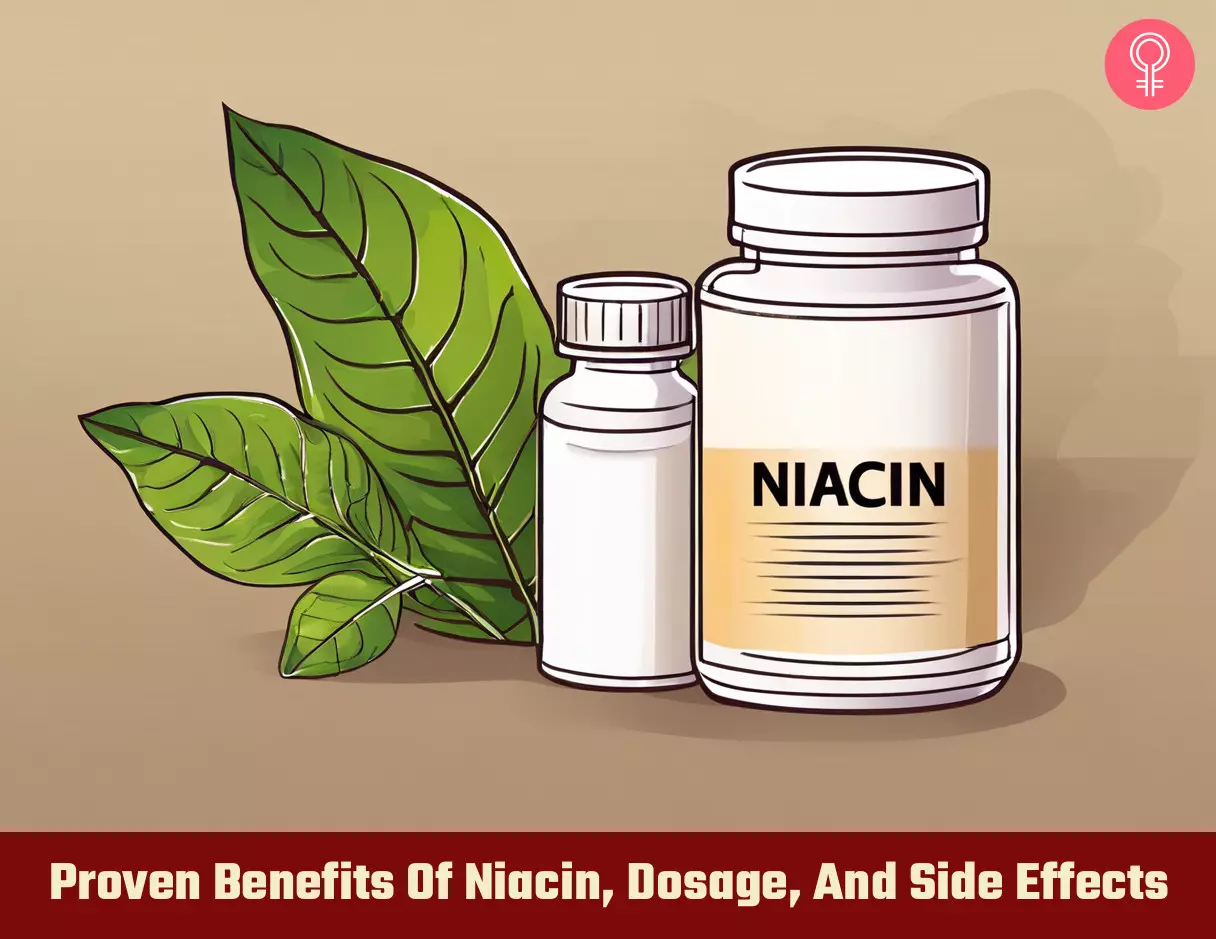
Image: Stable Diffusion/StyleCraze Design Team
Niacin is an important vitamin that can help improve your health. Check out this video to know more about this essential vitamin and its benefits.
Personal Experience: Source
StyleCraze's articles are interwoven with authentic personal narratives that provide depth and resonance to our content. Below are the sources of the personal accounts referenced in this article.
i. How Megadosing On Vitamin B3/Niacin Saved My Lifehttps://awaken-spirit.org/2013/02/14/how-megadosing-on-vitamin-b3niacin-saved-my-life/
References
Articles on StyleCraze are backed by verified information from peer-reviewed and academic research papers, reputed organizations, research institutions, and medical associations to ensure accuracy and relevance. Read our editorial policy to learn more.
- “Niacin”. US National Library of Medicine.
- “Niacin Deficiency”. US National Library of Medicine.
- “Niacin can boost “good” cholesterol”. Mayo Clinic.
- “Vitamin B3 (Niacin)”. University of Maryland Medical Center.
- “Case report of mental disorder induced by niacin deficiency”. Anning Hospital, China.
- “Niacin-respondent subset of…”. Liaocheng People’s Hospital, China.
- “Vitamin B-3”. Arthritis Foundation.
- “Pellagra”. MedlinePlus.
- “A daily dose of niacin may improve…”. The Independent.
- “Photodermatitis”. University of Maryland Medical Center.
- “NAD in skin: therapeutic…”. The University of Arizona, USA.
- “Possible Adverse Effects of High-Dose Nicotinamide: Mechanisms and Safety Assessment”. Biomolecules.
- “Role of sirtuins in lifespan regulation is linked to methylation of nicotinamide.
- “Niacin”. StatPearls, US National Library of Medicine.
- Effects of niacin on atherosclerosis and vascular function
https://www.ncbi.nlm.nih.gov/pmc/articles/PMC3145140/ - The role of HDL on plaque stabilization and regression: basic mechanisms and clinical implications
https://www.ncbi.nlm.nih.gov/pmc/articles/PMC5042826/ - Excess vitamin intake: An unrecognized risk factor for obesity
https://www.ncbi.nlm.nih.gov/pmc/articles/PMC3932423/
Read full bio of Thais Tisatto
Read full bio of Ravi Teja Tadimalla
Read full bio of Arshiya Syeda
Read full bio of Aparna Mallampalli











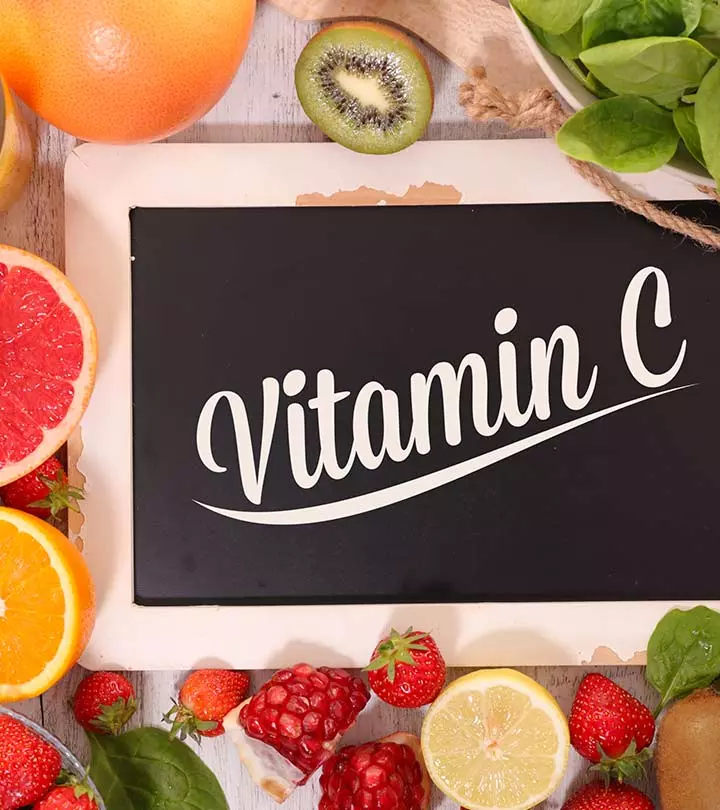




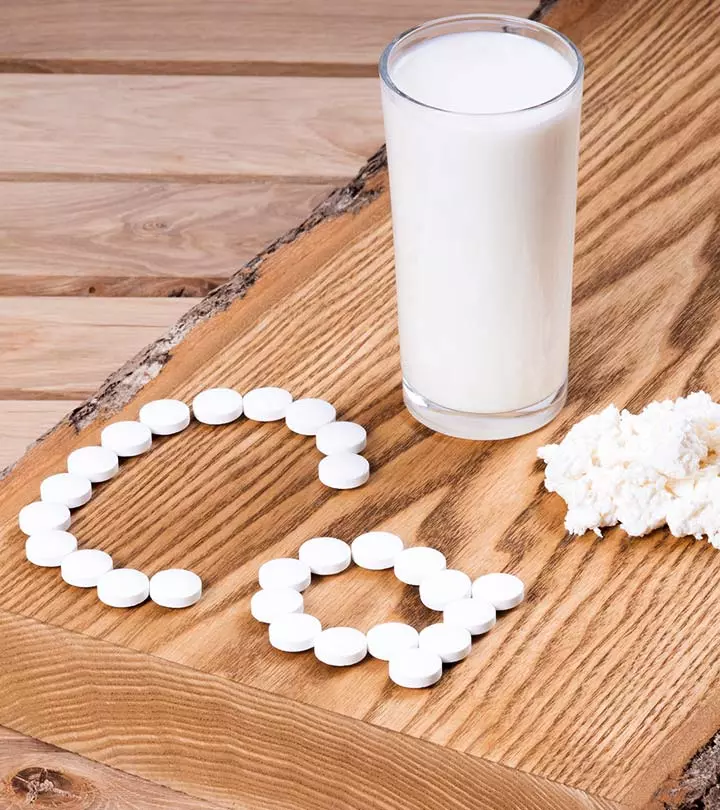





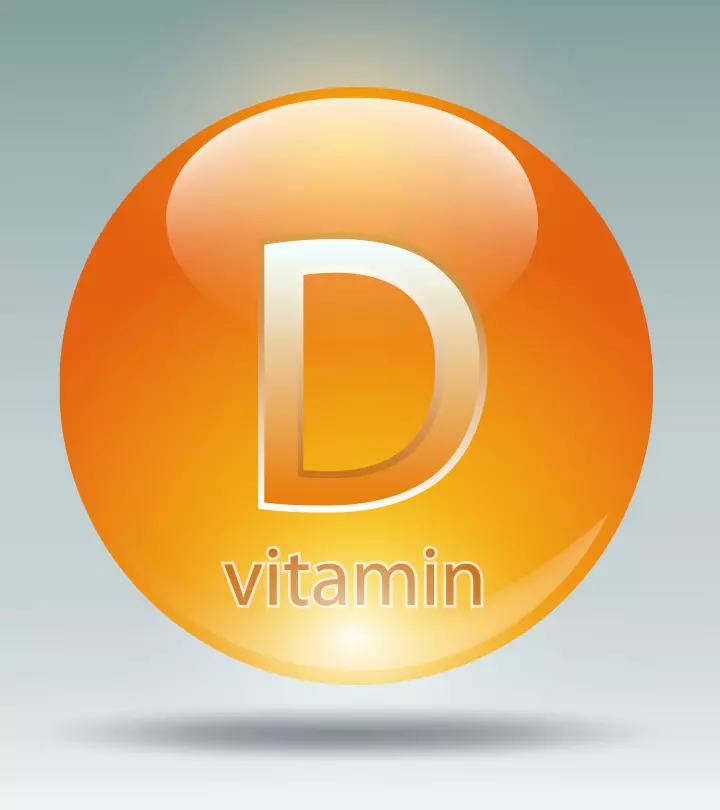


Community Experiences
Join the conversation and become a part of our empowering community! Share your stories, experiences, and insights to connect with other beauty, lifestyle, and health enthusiasts.